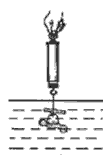问题
计算题
上周学校购买了一批水龙头,据商家说其材料铜质的,实验室的老师组织九年级的一些同学通过实验来验证商家的说法。他们把一个水龙头用轻质细线捆好后挂在弹簧测力计上,在空气中测得它的重力为1.6N,再把这个水龙头浸没在水中,如图所示,这时弹簧测力计的读数为1.4N(ρ铜=8.9×103kg/m3,g=10N/kg)。求:
(1)每个水龙头的质量是多少?
(2)这个水龙头浸没在水中时所受到的浮力有多大?
(3)这批水龙头的密度是多少?商家的说法是否正确?

答案
解:
(1)m=G/g= 1.6N/10N/kg =0.16 kg=160 g;
(2)F浮=G-F=1.6N-1.4N=0.2N;
(3)∵F浮=ρ水gV排
∴V排== F浮/ρ水g = 0.2N/(103kg/m3×10N/kg) =2×10-5m3=20 cm3∴V = V排= 20 cm3
∴ρ= =
= =8g/cm3=8×103kg/m3,∵8×103kg/m3<8.9×103kg/m3,故:这批水龙头不是纯铜的。
=8g/cm3=8×103kg/m3,∵8×103kg/m3<8.9×103kg/m3,故:这批水龙头不是纯铜的。
